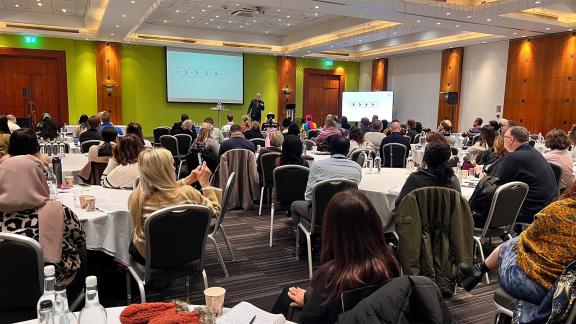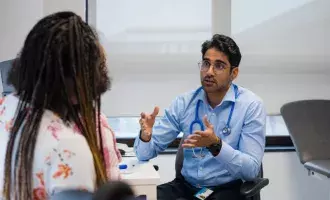Guide to case studies
What is a case study.
A case study is an in depth focussed study of a person, group, or situation that has been studied over time within its real-life context.
There are different types of case study:
- Illustrative case studies describe an unfamiliar situation in order to help people understand it.
- Critical instance case studies focus on a unique case, without a generalised purpose.
- Exploratory case studies are preliminary projects to help guide a future, larger-scale project. They aim to identify research questions and possible research approaches.
We are often looking to develop patient stories as case studies and these will use qualitative methods such as interviews to find specific details and descriptions of how your subject is affected.
Patient stories are illustrative or critical instance case studies. For example, an illustrative case study might focus on a patient with an eating disorder to provide a subjective view to better help trainee nutritionists understand the illness. A critical instance case study might focus on a patient with a very rare or uniquely complex condition or how a single patient is affected by an injury.

How do you do a case study?
1. get prepared.
- Be very clear about the purpose of the case study, why you are doing it and what it will be used for?
- Think about the questions you want to answer? What are your research or evaluation questions?
- Determine what kind of case study will best suit your needs? Illustrative, Critical Instance or Exploratory?
- Define the subject of study – is it an individual, a small group of people, or a specific situation?
- Determine if you need ethical approval to conduct this case study – you may be asked to prove that the case study will do no harm to its participant(s).
2. Get designing!
- Finalise your research or evaluation questions – i.e. what you want to know at the end of the study. Limit these to a manageable number – no more than 4 or 5.
- Think about where you will find the information you need to answer your questions. Interviewing research subjects and/ or observing will likely be the central methods of your case study, but do you need to look to additional data sources as well? For example, desk research or evidence/literature reviewing, interviewing experts, other fieldwork and so on.
- Create a plan outlining how you will gather the information you need to answer your research or evaluation questions. Include a timeframe and be clear that you have the resources and equipment to carry out the work. Depending on the nature of the case study or the topic being studied a case study may require several meetings/interviews over a period of many months, or it might need just a one off interview. What does yours need?
- Decide on the exact subject of the study. Is this a specific person or a small group of people? If yes, plan how you will get in touch with them and invite them to take part in the case study. How flexible can you be in terms of time and travel? Does this limit your access to potential participants?
- Design interview questions that are open and will enable the participant to provide in-depth answers. Avoid questions that can be answered with a single yes or no and make sure the questions are flexible and allow the participant to talk openly and freely.
3. Get recruiting!
- You may have a specific individual in mind, or specific criteria. You will need to invite people to participate and make very clear that they are able to withdraw at any point.
- You will need consent from the participants. Make sure the purpose of the case study, why you are doing it and what it will be used, the methods and time frames are extremely clear to the potential participants. You will need written consent that demonstrates that the participant understands this. Additionally, if you intend to digitally record an interview or take notes, make sure you have permission from the participants’ first.
- If your central method is observation, this will be open observation – the participant must be aware of your presence and agreed to it – you are not allowed to observe without the participants’ permission!
4. Get conducting!
- Interviewing – Agree a mutually suitable time and venue for the case study interview. This may be a one off or the first of many over several months. Make sure the participant is in an environment they are comfortable and able to talk in. Equally important, however is that the environment is safe for you and is conducive to conducting a case study interview – i.e. If it is a private space, are you safe? If it is a public space make sure it is not too noisy or likely to be affected by interruptions.
- Decide what is the best method of recording the interview information – digital recording is less intrusive and you can engage better in the conversation, than if you attempt to just take notes. Taking notes can mean that your concentration is focused on the writing rather than the listening and you can miss vital points. It can also be off-putting for the participant if there is no eye contact because you are scribing throughout the conversation. However, some participants will not like to be digitally recorded – so it is best to discuss this with them first. If you are digitally recording always test the equipment first. Even if you are digitally recording you will still need to take notes on key points, or things that you would like to investigate further, questions that arise or points at which you don’t want to interrupt the conversation or anything that will not be captured by the recording, such as body language or other observations.
- Depending on the total length of your case study, you might hold a one off interview, interview weekly, once every month or two, or just once or twice a year. Begin with the interview questions you prepared in the preparation and design phases, then iterate to dig deeper into the topics. Ask about experience and meaning — ask the participant what it’s like to go through the experience you’re studying and what the experience means to them. Later interviews are an opportunity to ask questions that fill gaps in your knowledge, or that are particularly relevant to the development of the case study or in answering your questions.
- Observing – recording observation can be done manually – i.e. taking notes – or digitally via a camcorder or similar. It is important to capture detail about the subject/participant and their interactions with others and the environment, their behaviour and other context an detail that is relevant to your questions.
5. Get analysing!
- Write up your notes or transcribe (Interviews), make notes (video) from your digital recording. Remember that if you are transcribing it is important to include pauses, laughter and other descriptive sounds and commentary on tone and intonation to better convey the story. Include the contextual information / the external environment and other observations that are important. Such as when and where the interview took place (you will not necessarily make this public) and any issues that arose such as interruptions that affected the interview or if there were multiple interviews anything of significance that happened in the periods between interviews.
- Thematically code (look for themes) and look for key parts of the interviews that will answer your original questions. Also be very aware that the may be new or unexpected information that has come through the process that is very important or interesting.
- Arrange the notes or transcriptions from the interviews and, or observations into a case study. It is not likely that you will be able to use the transcriptions without reorganising them, but if you are rewriting the story in your own words, be careful not to lose the meaning and language that reflects the participant.
6. Get sign off!
- Once you have drafted your case study make sure the participant(s) have sight of it and an opportunity to say whether you have captured their story and are representing it/them as they would like.
7. Get disseminating!
- More information about disseminating evaluations and case studies can be found on the Evaluation Toolkit site .
- Remember case studies are not designed for large group studies or statistical analysis and do not aim to answer a research question definitively.
- Do background/context research where possible.
- Establishing trust with participants is crucial and can result in less inhibited behaviour. Observing people in their home, workplaces, or other “natural” environments may be more effective than bringing them to a laboratory or office.
- Be aware that if you are observing it is likely that because subjects know they are being studied, their behaviour will change.
- Take notes -Extensive notes during observation will be vital.
- Take notes even if you are digitally recoding an interview to capture your own thinking, points to follow up on or observations.
- In some case studies, it may be appropriate to ask the participant to record experiences in a diary – especially if there are periods between your interviews or observations that you wish to capture data on.
- Stay rigorous. A case study may feel less data-driven than a medical trial or a scientific experiment, but attention to rigor and valid methodology remains vital.
- When reviewing your notes, discard possible conclusions that do not have detailed observation or evidence backing them up.
- A case study might reveal new and unexpected results, and lead to research taking new directions.
- A case study cannot be generalised to fit a whole population.
- Since you aren’t conducting a statistical analysis, you do not need to recruit a diverse cross-section of society. You should be aware of any biases in your small sample, and make them clear in your report, but they do not invalidate your research.
- Useful resource: ‘Case Study Research: Design and Methods’, Robert K Yin, SAGE publications 2013.
Case studies
Find inspiration for your own evaluation with these real life examples
Guidance from a range of organisations for in-depth advice
Services and support
Knowledgeable organisations who may be able to help you
Training resources
Want to learn more? Our training resources are a good place to start
The Evaluation and Evidence toolkits go hand in hand. Using and generating evidence to inform decision making is vital to improving services and people’s lives.
The toolkits have been developed by the NHS Bristol, North Somerset and South Gloucestershire Integrated Care Board (BNSSG ICB), the National Institute for Health and Care Research Applied Research Collaboration West (NIHR ARC West) and Health Innovation West of England .

We use cookies to give you the best experience of our website. By browsing you agree to our use of cookies.
Cookies on the NHS Long Term Plan site
We’ve put some small files called cookies on your device to make our site work.
We’d also like to use analytics cookies. These send information about how our site is used to a service called Google Analytics. We use this information to improve our site.
Let us know if this is OK. We’ll use a cookie to save your choice. You can read more about our cookies before you choose.
Change my preferences I'm OK with analytics cookies

Case studies
The NHS Long Term Plan will make sure the NHS is fit for the future.
Find out through our case studies and films about how the NHS is already making significant changes and developing to better meet the needs of patients and their families through every stage of life.
View case studies by topic:
- Cardiovascular
- Integrated care
- Learning disabilities
- Mental health
- Personalised care
- Primary care
- Urgent and emergency care
View case studies by life stage:
- Starting well
- Better care for major health conditions
- Ageing well
- Twitter LinkedIn
Case studies
Case study: cheshire and merseyside acute and specialist trusts collaborative.
A deep dive into the Cheshire and Merseyside Acute and Specialist Trusts Collaborative
A guide to supporting your internationally educated workforce
Our latest guide provides practical advice and case studies that board members can implement to address the challenges experienced by the internationally educated workforce.
Case study: Using peer review to strengthen clinical and care professional leadership arrangements within Gloucestershire
A case study exploring how an external peer review, facilitated by the Leading Integration Peer Support programme, created an opportunity for everyone’s voice to be heard at One Gloucestershire ICS
Revolutionise pay. Change lives. How on-demand pay gives NHS staff financial flexibility
This case study by our connect partners, Earnd reveals how on demand pay gives NHS staff financial flexibility.
Neighbourhood Integration Programme
Focusing on 'neighbourhood' level, this project draws together case studies on how more joined-up care has been delivered in four localities.
New models of care in practice
Helping spread learning from vanguards, we share nine case studies of new models of care in practice
Involving governors in large scale change
Stockport NHS Foundation Trust share how they have involved governors in Greater Manchester devolution plans

Refer to pharmacy: dedicated ward pharmacy model
Ward pharmacy model at East Lancashire Hospitals NHS Trust
Pauline Mountain MBE
Pauline shares her experience of being a carer governor at Lincolnshire Parternship NHS FT.
Michelle Wiggins
Michelle shares her experiences of being a public govenror at Lincolnshire Partnership NHS Foundation Trust
Gareth Pritchard
Gareth shares his experience of being a public governor at Robert Jones and Agnes Hunt NHS Foundation Trust
Natalie's story
Natalie shares her experience as a staff governor at Nottinghamshire Healthcare NHS Foundation Trust
Cookie preferences
We use cookies and reporting technology to ensure we offer you the best experience across our website and analyse our traffic. Click 'allow all cookies' if you're happy with this. Alternatively, you can choose the type of cookie you would like to accept by clicking 'manage cookies' below. For more information please see our cookie policy.
Necessary cookies
These cookies help make the website usable by enabling basic functions like page navigation and access to secure areas of the website. The website cannot function properly without these cookies.
Statistics cookies
Statistic cookies help us to understand how visitors are interacting with our website by collecting and reporting information anonymously. This helps us to understand where we can improve functionality on the website to provide visitors with a better experience.
Case studies

Population health management

Using population health data to underpin transformation change
Identifying and supporting high needs groups in Cheshire and Merseyside through detailed data analysis.
23 November 2023
Driving wellbeing in Merseyside through non-clinical but NHS-run services
Offering socially focused interventions to benefit an entire local community, not just patients of the trust.

A population health management-based allocation of funding in Dorset
Using data to decide how a tranche of national funding should be shared between primary care networks.

Creating community hubs to support local populations
Providing ‘one-stop shops’ for access to voluntary sector support in communities in Cornwall and the Isles of Scilly.
24 November 2023
Mental health
Scalable innovation for mental health care and support.
NHS and public health services in Shropshire worked in partnership to provide early mental health intervention and rapid-access pathways.
6 April 2023
Embedding mental health expertise into housing teams
Placing a mental health nurse in a housing team has ensured the right mental health support is in place and aligned with housing need.
Partnership working in Doncaster to support children and young people’s mental health
A multi-agency approach has led to reduced delays and improved access to help and support for children and young people in Doncaster.
Children and young people’s social prescribing service
Reducing the number of young people referred to secondary mental health care through social prescribing within primary care.
12 May 2022
NHS 111 mental health triage service
Enabling people in Hampshire, Southampton and Isle of Wight to get mental health support before a problem becomes a crisis.
13 January 2022
Population health
Building a supportive and empowering first 1,000 days of life.
Working collaboratively to support early parent-infant relationships across the Birmingham and Solihull Integrated Care System.
23 June 2022
Creating a smoke-free South Yorkshire and Bassetlaw Integrated Care System
An innovative smoking cessation programme in hospitals has made the treatment of tobacco addiction part of the routine care offered.
Improving population health outcomes with integrated data sets
Developing a population health and care platform helped identify and target underserved populations using an integrated data set.
Growing and creating health improvement within local health and care systems
Improving the conditions for place-based health to flourish through a co-creation approach to health and wellbeing.
Provider collaboration
Improving outcomes for premature babies in the west and south west of england.
A unique perinatal care bundle has improved the outcomes for premature babies across the west and south west of England.
21 April 2022
Reducing paediatric surgery waiting lists
Bath and North East Somerset, Swindon and Wiltshire worked together to reduce waiting times that children were facing for surgery.
Collaboration between primary care and community services to support care for older people
Primary care and community services are working together in North Yorkshire to appoint community posts to support dementia and end-of-life care.
Sheffield primary care mental health transformation
A collaboration between primary care, the mental health trust and the voluntary sector has helped to reduce mental health inequalities in Sheffield.
Community capacity
Supporting people affected by frailty in hull and east riding.
A community frailty pathway has brought together consultants, GPs, advanced nurse practitioners, social workers, pharmacists, other specialists, and the voluntary sector, to work as a single system supporting vulnerable patients.
11 January 2022
Urgent community response across Mid and South Essex
A new urgent community response team is providing a single integrated service that responds to people experiencing an acute medical crisis in their own home.
Reducing conveyances of older patients in South Warwickshire
How a virtual ward has resulted in 48 per cent of conveyances for over 80s being avoided.
Diverting children from unnecessary hospital attendances in York
A community health village in York is delivering services on behalf of busy providers and diverting children from unnecessary hospital attendances.
Elective recovery
Tackling long waiting lists and health inequalities in coventry and warwickshire.
How Coventry and Warwickshire is making inroads on the growing numbers of patients waiting for more than 18 weeks for treatment.
Expanding capacity and creating green pathways at Croydon Health Services NHS Trust
How Croydon has been able to continue with clinically prioritised elective work and offer assistance to other south-west London trusts.
Working as a system to recover the backlog: Harrogate and District NHS Foundation Trust
How one of North Yorkshire’s leading hospitals is working with partners to tackle the backlog of care.
Restoring elective work and looking to the future at East Sussex NHS Healthcare Trust
How East Sussex has been able to restore elective services by managing its case mix, increasing day-case procedures.
Acting early to restart elective work at Bolton NHS Foundation Trust
How Bolton and system partners in Greater Manchester approached restarting elective services.
More case studies
Reducing out-of-area placements.
Reducing the number of out-of-area placements for patients receiving mental health services.
15 May 2024
Innovation through robotic-assisted operations to address health inequities
Robotic-assisted surgery is improving access to the best possible care across the Black Country and helping to reduce health inequities.
18 January 2024

Sunday, January 20, 2019
- Labels: Case Studies , Project Failure
Case Study 1: The £10 Billion IT Disaster at the NHS

If you want to make sure your business critical project is off to a great start instead of on its way on my list with project failures? Then a New Project Audit is what you are looking for. If you want to know where you are standing with that large, multi-year, strategic project? Or you think one of your key projects is in trouble? Then a Project Review is what you are looking for. If you just want to read more project failure case studies? Then have a look at the overview of all case studies I have written here .
Timeline of Events
What went wrong, how nhs could have done things differently, closing thoughts.

Case Studies
NHS Professionals works with over 100 NHS Trusts and healthcare organisations across the country, putting people in places to care. Below, you'll be able to explore the different real-world workforce solutions we continue to provide to support patient care.
NHS Professionals recruits call handlers for seven ambulance Trusts
We exceeded our target to recruit 250 whole time equivalent call handlers. Our recruitment campaign generated over 24,000 applications of which 299 of these call handlers were successfully appointed. Our work on this bespoke recruitment campaign has led individual Trusts to continue collaborating with NHS Professionals to recruit additional roles for the future.
New flexible support worker role launched at University Hospitals Plymouth NHS Trust
Starting in December 2020, NHS Professionals implemented a brand new support staff group into University Hospitals Plymouth NHS Trust to support patient experience during the demands of the COVID-19 pandemic.
The international team helps Lancashire and South Cumbria NHS Foundation Trust solve mental health nurse challenge
NHS Professionals International forged a new partnership with Lancashire and South Cumbria NHS Foundation Trust to support their Registered Mental Health Nurse needs. Due to geography, the Trust faced a significant challenge when it came to sourcing this workforce. As a result, this led to Lancashire and South Cumbria becoming the first Trust to recruit international Registered Mental Health Nurses at scale.
NHS Professionals International exceeds targets for international nurse recruitment across the Pan-Mersey collaborative.
NHS Professionals International (NHSPI) was appointed to recruit and deliver over 600 nurses by December 2021 and also help the collaboration form successful OSCE training hubs. NHS Professionals International exceeds targets for international nurse recruitment across the Pan-Mersey collaborative.
International recruitment partnership delivers hundreds of nurses to specialist areas
In the spring of 2021, University Hospitals Bristol and Weston NHS Foundation Trust (UHBW) faced a recruitment challenge when it came to nursing, requiring approximately 40 posts to be filled.
A steady stream of international nurses successfully delivered for Hillingdon Hospitals
Building a positive and open working relationship with the Trust, NHSPI worked flexibly to navigate the unique challenge of interview panel availability over the busy winter period, in order to meet the target required. Additionally, an unprecedented problem arose as the Ukrainian crisis developed in early 2022, causing the priority visa service to be suspended which increased processing times.
Alder Hey Childrens NHS Foundation Trust
NHS Professionals International started working with Alder Hey Children’s NHS Foundation Trust in 2019. Despite the world renowned reputation of the Trust, they were not able to meet their recruitment requirements from the UK market.
University Hospital Southampton NHS Foundation Trust »
In 2016, University Hospital Southampton NHS Foundation Trust (UHS) were experiencing a high vacancy rate, with over 380 posts that they could not fill locally. The vacancies remained in spite of their strong reputation and a rating of ‘Good’ from the Care Quality Commission. In order to strengthen their recruitment, the Trust approached NHSP International to source nurses from the Philippines.
South Tyneside and Sunderland NHS Foundation Trust
After working with the Trust since 2016, NHSP International now routinely deliver 20 nurses a month from the Philippines. This stable programme enables the Trust to keep vacancies at a manageable level.
East Suffolk and North Essex NHS Foundation Trust (ESNEFT)
Colchester Hospital University NHS Foundation Trust began their partnership with NHSP International in August 2016, when the Trust had over 200 registered nurse vacancies. In July 2018, the trust merged with neighbouring Ipswich Hospital NHS Trust to form East Suffolk and North Essex NHS Foundation Trust – becoming the largest NHS organisation in the region.
Patient Safety Support Worker Programme helps eliminate agency use in enhanced care at Harrogate and District NHS Foundation Trust
NHS Professionals achieved a 100% conversion in agency hours to Bank by creating an Enhanced Care Pool Ward staffed by graduates of our Patient Safety Support Worker (PSSW) Programme, which trains people to care for vulnerable patients.
Collaboration boosts Bank fill and drives down agency costs at Southern Health NHS Foundation Trust
In June 2023, we improved overall Bank fill for nurses by 10%, compared to June 2022. This improvement translated into a reduction in agency use of over 3% for qualified nurses, helping the Trust reach the 3.7% national agency spend reduction target.
NHS Professionals generates significant cost savings using administration and clerical Bank Members over agency at Buckinghamshire Healthcare NHS Trust
Using the average hourly cost of an agency shift at the Trust, NHS Professionals achieved a saving of more than £215,000 over a 12 month period.
Mid Yorks saves £1 million a year
NHS Professionals (NHSP) were tasked with reducing excessive agency spend within the Trust and managing the internal staffing bank for Nursing and Midwifery, Admin and Clerical, and Allied Health Professionals (Operating Department Practitioners) to grow the number of bank members, and to make it more efficient.
Driving down agency spending at Somerset NHS Foundation Trust with the NHS Professionals National Bank™
In August 2022, Somerset joined forces with NHS Professionals to reduce its agency usage for Registered and Unregistered Nurses, and to create a flexible worker pool to take precedent over agency shifts.
Agency usage completely removed for the Healthcare Support Worker staff group at South London and Maudsley NHS Foundation Trust
South London and Maudsley NHS Foundation Trust currently provides the widest range of NHS mental health services in the UK and serves a local population of 1.3 million people. In May 2020, NHS Professionals launched a campaign to work with the Trust to remove Healthcare Support Worker (HCSW) agency use.
Partnering with NHS Professionals National Bank supports Agency reduction at The Dudley Group
The Dudley Group NHS Foundation Trust is the main provider of hospital and adult community services in the West Midlands area with three main hospital sites and over 40 community centers across the borough. NHS Professionals formed an agency migration partnership in January 2023 with The Dudley Group to help it reduce agency spend by 3.7% in line with NHSE’s latest guidance. Using our pioneering NHS.
Pilot partnership delivers significant staffing savings at Warrington and Halton Teaching Hospitals NHS Foundation Trust
As with all NHS Trusts during the pandemic, Warrington and Halton Teaching Hospitals NHS Foundation Trust experienced severe pressures surrounding their workforce supply agency usage in Nursing and Midwifery.
A rise in bank fill and reductions in agency usage at Southport & Ormskirk Hospital NHS Trust
With NHS Professionals’ (NHSP) support and expertise, the Trust wanted to grow their Bank Members, operate more efficiently, and ultimately, completely remove their reliance on external agencies which as of August 2018 was 22% of shift demand.
Estates and Facilities Department at The Pennine Acute Hospitals NHS Trust enjoys 0% agency usage
Eliminating agency usage at alder hey children’s nhs foundation trust.
Having worked with the Trust since 2014, NHS Professionals (NHSP) have been on a continuous mission to ensure safe, effective staffing, excellent patient care and exceptional value for the Trust.
Barnsley takes control of agency spend
Prior to engaging with NHSP in 2018, the nursing bank at the Trust was operated by a small internal team that reported through operations. Bank recruitment was inconsistent, compliance with necessary training requirements wasn’t well understood and the investigation of complaints and incidents wasn’t robust. The Trust spend on expensive agency staff was very high, operated at ward level and largely invisible, apart from the large invoices.
Upskilling Bank Members closes support worker gap at Alder Hey Children's NHS Foundation Trust
The trust has worked towards a 0% HCSW vacancy rate. From April 2021 to July 2023, we supplied 63 healthcare support workers to the Trust, delivering a total of 44,472 hours of care. Around 20 have gone on to be employed at the Trust on a substantive basis.
NHS Professionals Academy successfully delivers phase one of leadership programme
After a competitive procurement exercise in 2022, the NHS Professionals Academy was awarded phase one provision of a leadership course for University Hospitals Sussex NHS Foundation Trust.
Collaboration, co-operation and communication boosts recruitment performance across the North West »
Before the North West Client User Group was created, recruitment was often siloed amongst individual Trusts, not necessarily taking advantage of collaborative working, group leverage or associated smarter working and cost efficiencies.
Back to all publications
Read our latest news

Interested in partnering with NHSP?
Email our workforce specialists to arrange a call or meeting to see how we can help you: Fay Toms - [email protected]. If you are an agency looking to partner with NHS Professionals then for International Nursing supply email [email protected] or for general agency supply email [email protected].


Already a partner?
If you're interested in any additional services please email our Senior Solution Team: Morgan Warrilow – [email protected]
Internet explorer is no longer supported
We have detected that you are using Internet Explorer to visit this website. Internet Explorer is now being phased out by Microsoft. As a result, NHS Digital no longer supports any version of Internet Explorer for our web-based products, as it involves considerable extra effort and expense, which cannot be justified from public funds. Some features on this site will not work. You should use a modern browser such as Edge, Chrome, Firefox, or Safari. If you have difficulty installing or accessing a different browser, contact your IT support team.
Case studies and webinars from health care professionals
Read about how people across the NHS are implementing, using and benefiting from providing online access to patient records. Choose from our selection of case studies, blogs, webinars and articles of interest about enabling patients to view their GP health record information through the NHS App and other online services.
Case studies
Watch a recording of the accelerating patient online access Safeguarding webinar presented by Dr James Higgins and Dr Devin Grey, which focuses on reducing harm and safeguarding risk reduction, including the reporting mechanism for safeguarding incidents and improving efficacy.
Read how one practice successfully launched online access to new record information and supported patients whose first language is not English.
Westbourne Medical Centre switched on patient access to records on 1 March 2022 and was one of our 16 early adopter sites that have worked with us to share their learning, lessons, and the benefits of general practice record access.
Boughton Health Centre have been providing detailed coded access to patient records since 2015.
They are now supporting even more patients to access their records as part of the Accelerated Citizen Access to GP Data programme, as an early adopter pilot site.
Paxton Green (EMIS) is a large practice in London, serving approximately 19,000 patients. In May 2022, it became one of 16 practices to enable online access to prospective record entries as an early adopter (pilot site).
It had previously offered historic access to all patients upon request but since switching on access 97% of its patients with online accounts now benefit from automatic access to their prospective records. Aeira Marsh, IT Operations Manager, was heavily involved in work to ensure that patients who might be at risk or harm or distress from being given automatic access to their online records were safeguarded.
A selection of webinar recordings which include primary care colleagues who have shared their experiences of giving patients online access to their new health record information, enabling online record access and safeguarding patients.
Watch a recording of the 5 October General Practice webinar which included a presentation by Dr Muhammad Akhtar a GP in Morecambe. The time stamp is 22.50 for the programme update and 26.47 for Dr Akhtar's presentation (requires NHS Future account).
Watch a recording of the accelerating patient online access Safeguarding webinar presented by Dr James Higgins and Dr Devin Grey, which focuses on reducing harm and safeguarding risk reduction, including the reporting mechanism for safeguarding incidents and improving efficacy. You will require a NHS Futures account to view.
A TPP-focused webinar on enabling online record access and safeguarding patients.
The session included a discussion between Helen Crowther, National Digital Primary Care Nurse Lead for NHS England, and Dr Tim Caroe, NHS England South East Medical Director Primary Care Transformation and GP at The Lighthouse Medical Practice. This was followed by a presentation from Richard Bowron, business manager, and Jemma Atkinson, practice manager, at Pelton and Fellrose Medical Group.
The questions from the webinar were collated and have been added to the existing FAQ document . You can also watch the recording , view the presentation slides (requires FutureNHS login) and find further guidance on safeguarding .
Dr Shammy Noor, GP Partner at Darwin Medical Practice, shares his practice’s experience of offering automatic online health record access, as well as his own experiences as a patient, at the General Practice Webinar in May 2023. Requires an NHS Future account to view. (10.53 is our programme update and 17.10 for Shammy Noor)
View the early adopter experience webinar 23 March 2023 (requires NHS Future account) and find out how early adopter practices prepared, with top tips for making the process run smoothly. Learn about their different approaches to safeguarding at-risk patients and how improved record access has made a difference to staff and patients.
Patient case studies
Meet some of the patients who access their GP health record through the NHS App and learn more about their stories and why they recommend you use the app yourself.
Further information
Explore some of the benefits of giving people online access to their health record information via the NHS App.
Our full archive of NHS App blogs.
Last edited: 26 March 2024 2:41 pm
- - Google Chrome
Intended for healthcare professionals
- Access provided by Google Indexer
- My email alerts
- BMA member login
- Username * Password * Forgot your log in details? Need to activate BMA Member Log In Log in via OpenAthens Log in via your institution

Search form
- Advanced search
- Search responses
- Search blogs
- Writing a case report...
Writing a case report in 10 steps
- Related content
- Peer review
- Victoria Stokes , foundation year 2 doctor, trauma and orthopaedics, Basildon Hospital ,
- Caroline Fertleman , paediatrics consultant, The Whittington Hospital NHS Trust
- victoria.stokes1{at}nhs.net
Victoria Stokes and Caroline Fertleman explain how to turn an interesting case or unusual presentation into an educational report
It is common practice in medicine that when we come across an interesting case with an unusual presentation or a surprise twist, we must tell the rest of the medical world. This is how we continue our lifelong learning and aid faster diagnosis and treatment for patients.
It usually falls to the junior to write up the case, so here are a few simple tips to get you started.
First steps
Begin by sitting down with your medical team to discuss the interesting aspects of the case and the learning points to highlight. Ideally, a registrar or middle grade will mentor you and give you guidance. Another junior doctor or medical student may also be keen to be involved. Allocate jobs to split the workload, set a deadline and work timeframe, and discuss the order in which the authors will be listed. All listed authors should contribute substantially, with the person doing most of the work put first and the guarantor (usually the most senior team member) at the end.
Getting consent
Gain permission and written consent to write up the case from the patient or parents, if your patient is a child, and keep a copy because you will need it later for submission to journals.
Information gathering
Gather all the information from the medical notes and the hospital’s electronic systems, including copies of blood results and imaging, as medical notes often disappear when the patient is discharged and are notoriously difficult to find again. Remember to anonymise the data according to your local hospital policy.
Write up the case emphasising the interesting points of the presentation, investigations leading to diagnosis, and management of the disease/pathology. Get input on the case from all members of the team, highlighting their involvement. Also include the prognosis of the patient, if known, as the reader will want to know the outcome.
Coming up with a title
Discuss a title with your supervisor and other members of the team, as this provides the focus for your article. The title should be concise and interesting but should also enable people to find it in medical literature search engines. Also think about how you will present your case study—for example, a poster presentation or scientific paper—and consider potential journals or conferences, as you may need to write in a particular style or format.
Background research
Research the disease/pathology that is the focus of your article and write a background paragraph or two, highlighting the relevance of your case report in relation to this. If you are struggling, seek the opinion of a specialist who may know of relevant articles or texts. Another good resource is your hospital library, where staff are often more than happy to help with literature searches.
How your case is different
Move on to explore how the case presented differently to the admitting team. Alternatively, if your report is focused on management, explore the difficulties the team came across and alternative options for treatment.
Finish by explaining why your case report adds to the medical literature and highlight any learning points.
Writing an abstract
The abstract should be no longer than 100-200 words and should highlight all your key points concisely. This can be harder than writing the full article and needs special care as it will be used to judge whether your case is accepted for presentation or publication.
Discuss with your supervisor or team about options for presenting or publishing your case report. At the very least, you should present your article locally within a departmental or team meeting or at a hospital grand round. Well done!
Competing interests: We have read and understood BMJ’s policy on declaration of interests and declare that we have no competing interests.

- Organisational Development Matters
- Case studies in OD
Case study template
NHS Education for Scotland (NES)
This template can be used to complete your case study and that will provide us with all the information we need to publish it on the organisational matters zone. Your name and board will be kept completely confidential.
Publisher: NHS Education for Scotland (NES)
Type: Document
Audience: General audience

Download (22 KB)

Archive for the ‘Case study’ category
Date published: 13th May 2024
Reappointment of NHS Resolution Non-Executive Director
Nigel Trout‘s appointment as a Non-Executive Director (NED) of NHS Resolution has been extended from 1 July 2024 to 30 September 2024, or until a new Non- Executive Director is appointed, whichever is sooner. The announcement was made today by the Department of Health and …
Read more [Continue reading] Reappointment of NHS Resolution Non-Executive Director
Date published: 8th May 2024
Fixed Recoverable Costs for Lower Damages Clinical Negligence Claims
On 15 September 2023, the Government announced that it will introduce fixed recoverable costs (FRC) and a new streamlined process for clinical negligence claims with a damages value of £1,501 to £25,000 in England and Wales. This follows a consultation on Fixed Recoverable Costs for …
Read more [Continue reading] Fixed Recoverable Costs for Lower Damages Clinical Negligence Claims
Date published: 16th April 2024
Reappointment of NHS Resolution Non-Executive Directors
Professor Dame Lesley Regan has been re-appointed as a Non-Executive Director (NED) of NHS Resolution for three years, from 6 December 2024 to 5 December 2027. In addition, the appointment of Charlotte Moar as a NED and Audit and Risk Committee (ARC) Chair of NHSR …
Read more [Continue reading] Reappointment of NHS Resolution Non-Executive Directors
Date published: 19th March 2024
Applications open for two Non-Executive Director posts
Ministers are seeking to appoint two new Non-Executive Director (NEDs) to the board of NHS Resolution, one of which will be responsible for Chairing NHS Resolution’s Audit and Risk Committee (ARC). Non-Executive Directors are remunerated at a standard rate of £7,883 per annum, with the …
Read more [Continue reading] Applications open for two Non-Executive Director posts
Date published: 6th March 2024
Experienced actuary appointed as Non-Executive Director at NHS Resolution

NHS Resolution is delighted to announce that Anu Ralhan has been appointed as Non-Executive Director. The appointment has been made by the Secretary of State for Health and Social Care today. Anu has been an independent member of NHS Resolution’s Reserving and Pricing Committee (RPC) since …
Read more [Continue reading] Experienced actuary appointed as Non-Executive Director at NHS Resolution
Date published: 18th September 2023
Fixed Recoverable Costs for Lower Value Clinical Negligence Claims

On 15 September 2023, the Government announced that it will introduce fixed recoverable costs (FRC) and a new streamlined process for clinical negligence claims with a damages value of £1,501 to £25,000 in England and Wales. It is proposed these changes be implemented for claims …
Read more [Continue reading] Fixed Recoverable Costs for Lower Value Clinical Negligence Claims
Date published: 14th September 2023
Emergency Medicine national conference – 9 October

NHS Resolution will be holding an emergency medicine conference on Monday 9 October 2023 at the Royal College of Physicians. The national event, entitled Implementing recommendations: Shared insights to reduce claims in emergency medicine, is to bring together professionals working in emergency departments across England …
Read more [Continue reading] Emergency Medicine national conference – 9 October
Date published: 8th September 2023
New Head of Case Advice appointed to the Practitioner Performance Advice service

NHS Resolution is pleased to announce the appointment of Dr Sarah Coope as Head of Case Advice. The Head of Case Advice is a new, senior role in the Practitioner Performance Advice service, which has been established to further strengthen the efficient and effective delivery …
Read more [Continue reading] New Head of Case Advice appointed to the Practitioner Performance Advice service
Navigate to more results pages
- Next page: ›
- Last page: »
- Awards and accreditation badges

Search our site
- Privacy and cookies
- Terms and conditions
- Accessibility

- Practitioner
- Foundation & Practitioner
- Practitioner (Bridging from PRINCE2 6th Edition)
- PRINCE2® 6th Edition
PRINCE2 Agile®
- PRINCE2 Agile and PRINCE2 Plus Pack
- Introduction to MS Project
- Training seminars
- Free downloads
- Virtual learning
- Virtual FAQs
- PRINCE2 games
About PRINCE2®
- Why should you do PRINCE2?
- What is PRINCE2?
- PRINCE2 case studies
- PRINCE2 FAQs
- PRINCE2 methodology
- PRINCE2 qualifications
- PRINCE2 blended learning
- PRINCE2 virtual learning
- How does PRINCE2 work with the PMBOK guide?
- PRINCE2 examination format
- PRINCE2 Consulting
- PRINCE2 training for the public sector
- Corporate development

Australia locations
Europe locations, germany locations, netherlands locations, new zealand locations, poland locations, south africa locations, united arab emirates locations, united kingdom & ireland locations.
- Get a quote
Discover your potential - Up to 30% off! Click here to view all courses
- PRINCE2 process model
- PRINCE2 infographic
- PRINCE2® Process Map
- PRINCE2 Templates
- PRINCE2 for Business
- PRINCE2 Exam Resources
- PRINCE2 Qualification & Complementary Courses
- Resources for Project Managers
- PRINCE2 Training Tips
- PRINCE2 and PMI
- PRINCE2 Agile
- PRINCE2 Case Studies
Treading the Learning Path
Find out how ILX Group in partnership with Sussex Health Informatics Service created unique learning pathways to support the delivery of enhanced front-line patient care through learning technology.
In the NHS, IT plays a major role in delivering better services and ensuring that patients get the best possible care. In order to accelerate the delivery of IT systems to the NHS, The Department of Health introduced the National Programme for IT (NPfIT). Sussex Health Informatics Service (HIS) was established in 2004 to provide effective Information Management and Technology (IM&T) services and to facilitate the implementation of the NPfIT across Sussex.
By the very nature of its remit, the highest standard of staff training has always been at the heart of Sussex HIS. ILX were already the trusted digital learning provider of the organisation when, in 2006, demand for staff training increased sharply and the training team began to experience limitations with its existing training provision.
Wendy Dearing, senior lead for training, change & process continuity, and head of Education Training Development (EDT) for Sussex HIS said: "We were using approximately 40 individual learning disks from ILX to provide staff with PRINCE2 training across several sites. However, as demand for PRINCE2 training rose at the same time as the need to provide generic project and programme management skills to staff, we felt that the system needed to be improved. As demand outstripped supply we had the undesirable situation of people having to wait for training, and there was also the cost and inconvenience associated with scheduling large training sessions for staff based throughout the county."
However, the EDT team at Sussex HIS felt that their largest issue was that the existing training system did not allow a central view of staff progress. Each learner had to report progress manually before attending an on-site PRINCE2 Foundation exam.
"We recognised that the key to enhancing the quality and scope of our training provision was to gain central visibility of the access, progress and performance of our 400 staff," continued Dearing.
Sussex HIS approached ILX with their requirements and the company proposed that training be delivered through the ILX Group Best Practice Portal.
To read more download the full case study by clicking here .
Global Coverage

Building more engaged teams in the NHS
How Gateshead Health NHS Trust improved teamwork and reduced absence

It creates a common language that makes it easier to identify strengths and address weaknesses, so that individuals and teams can perform at their highest level.
The Gateshead Health NHS Trust identified that teamwork was one of their major development areas and introduced Insights Discovery to improve communication and collaboration.
We helped the teams to:
- Understand the behavioural preferences of individuals and how these can sometimes clash to cause conflict
- Identify practical actions to take that would help people with different preferences work better together
- Work together to make a more supportive and engaging team environment
One team worked within a particularly stressful unit and suffered from high levels of stress-related absence. After implementing Insights Discovery and taking real steps to promote its application in the workplace, absence levels were reduced from 40% to 3%.
This team has since won three national awards.
reduction in absenteeism

It is life changing and the teams that I’ve worked with have a new language.
Joanne Coleman
Safeguarding Strategic Lead, NHS Trust
Share this page:
Let us help your business today. contact us now to start your journey..
- News & blogs
Improving workforce wellbeing through a staff-led approach
17 May 2024
- Twitter logo
- Facebook logo
- LinkedIn logo

The 2021 NHS Staff Survey showed that while staff at Hertfordshire Partnership University NHS Foundation Trust (HPFT) were passionate about delivering the best care for patients, they reported high levels of burnout and exhaustion and there were significant absences related to mental health. To help staff better prioritise self-care, the trust has worked to improve its health and wellbeing package, engaging with staff to update and co-produce its offer. This staff-led approach brought improvements in results across a number of measures for workforce wellbeing.
Key benefits and outcomes
- An increase of 2.3 per cent in staff saying the trust takes positive action to support health and wellbeing.
- 81.5 per cent of staff said they felt a sense of being looked after by HPFT.
- Staff reporting musculoskeletal issues reduced by 3.2 per cent and the trust is no longer an outlier compared to the national average.
- HPFT was ranked in the top five mental health and learning disability trusts to work for in England, measured by staff recommending it as a place to work.
What the organisation faced
Results from the 2021 NHS Staff Survey showed staff at HPFT are highly committed and motivated, and passionate about caring for their patients. However, it also highlighted that staff were often working unpaid hours, coming into work unwell, and scores relating to experiencing musculoskeletal issues were significantly higher than average.
The trust wanted to ensure staff preserved the level of passion and compassion shown to patients, while improving and prioritising their own wellbeing.
What the organisation did
The trust developed a project to create new a wellbeing strategy. This involved staff from the outset through engagement events and staff networks. As a result, HPFT focused its wellbeing strategy and delivery plan on self-care.
One initiative saw the introduction of externally commissioned health MOTs across key sites. Over 10 per cent of staff took up the offer, filling all the slots available at the time. Feedback was very positive, with 93 per cent finding the sessions valuable, 62 per cent saying it had motivated them to make lifestyle changes and 23 per cent saying they had discovered a health issue they had been unaware of.
The trust also held a self-care and wellbeing festival promoting the range of staff support services available, while offering a range of physical and stress therapies to staff on the day. The event also provided more than 1,600 portions of food and almost 1,000 self-care sessions. Feedback was incredibly positive and helped shape a similar winter festival.
Throughout the year, the trust used engagement events, newsletters and its network of wellbeing champions to check in with staff and ensure its offer remained relevant and supportive. The project team also monitored workforce metrics, encouraged staff feedback and evaluated each intervention introduced.
Managers received increased support through training programmes which helped improve confidence in dealing with wellbeing topics including menopause and mental health.
The appraisal system was updated to ensure it included conversations about wellbeing, as well as personal aspirations and support requirements. Staff induction was also updated to include the importance of self-care and promote the health and wellbeing offer.
Senior-level buy-in was established from the outset. The project proposal was taken to the trust's people and OD group, which was regularly updated on progress using the staff feedback gathered and evaluations of the interventions offered.
Results and benefits
HPFT saw a range of benefits following the introduction of its health and wellbeing strategy including a reduction in mental health and musculoskeletal-related sickness absence rates compared to those recorded in 2021/22. This was further evidenced in the trust’s 2022 NHS Staff Survey which showed:
- A 2.3 per cent increase in staff saying the trust takes positive action to support health and wellbeing.
- Staff reporting musculoskeletal issues reduced by 3.2 per cent and is no longer an outlier compared to the national average.
- 2.5 per cent fewer staff reported working additional unpaid hours.
- 1.5 per cent fewer staff reported feeling unwell as a result of work-related stress.
The Health Service Journal’s analysis of the 2022 NHS Staff Survey ranked HPFT in the top five mental health trusts to work for in England – resulting from the percentage of staff recommending the organisation as a place to work.
Project evaluations also found 70 per cent of staff felt a positive impact from the wellbeing initiatives, while 81.5 per cent said they felt looked after by HPFT and 82 per cent agreed that the wellbeing offer was a perk of working for HPFT.
The project team reports that the example set by staff, managers and senior leaders prioritising their own wellbeing has created a ripple effect, normalising this within the organisation, helping to improve attraction and retention of the workforce and the level of patient care.
Overcoming obstacles
The main obstacles were around resources. The project was run by a small team with limited funding, so the team had to find creative ways of organising and delivering everything they set out to.
Communication was also challenging due to the size of the organisation. It was difficult to cascade messages across a large number of busy staff and was ultimately achieved thanks to the network of health and wellbeing champions who helped spread the information through their channels, as well as the creative use of notice boards.
Talking to and co-producing the new wellbeing offer with staff from the outset was key to the success of the initiative. By using this approach, HPFT achieved great engagement and involvement, reaching large numbers of staff across the organisation.
It was also important to continue to listen to staff and remain flexible, continuously adapting activities based on feedback received. This ensured the level of engagement remained high throughout while the uptake on the offer continued to be consistently high and well received.
You can learn more about the work in this case study by contacting Louise Thomas, deputy director of people and OD at Hertfordshire Partnership University NHS Foundation Trust, at [email protected] .
Related content

NHS Staff Survey 2023: health and wellbeing overview
Summary of the health and wellbeing findings from the 2023 NHS Staff Survey.
12 March 2024

NHS Employers responds to NHS Charities Together Workforce Wellbeing Programme announcement
Caroline Waterfield responds to the NHS Charities Together £16m Workforce Wellbeing Programme launch.
15 May 2024

Financial education and wellbeing
Our financial wellbeing web page supports you to develop a robust approach to support your staff with financial wellbeing in the workplace.

2024/25 Diversity in Health and Care Partners Programme launched
Applications are now open for our Diversity in Health and Care Partners Programme, commencing in September 2024.
14 May 2024
Click here for important information about the recall of certain Philips Respironics Sleep and Respiratory Care devices ›
Search terms
Small size, big vision
By Philips ∙ Featuring Wye Valley NHS Trust ∙ Feb 28, 2022 ∙ 5 min read
Hospital operations
Optimization services
Wye Valley NHS Trust is one of the smallest NHS Trusts in the UK. Located in a rural part of southwest England, it provides services via Hereford County Hospital and three community hospitals for Herefordshire, with a population of over 190,000, plus 40,000 patients in Mid Wales.
- 80% of the population lives more than five miles from a market town or Hereford.
- The Trust employs around 3,000 staff.
Case study at-a-glance
Wye Valley NHS Trust
A significant and increasing diagnostic imaging demand, exacerbated by aging equipment and staff shortages
A Managed Service strategic partnership with Philips oversaw a £2 million radiology service redevelopment program that paved the way for a trust’s vision for the radiology department of the future.
- MRI patient throughput increased by at least four patients per day
- Enhanced patient flows in the radiology department
- 60% of equipment replaced within the first two years
- >98% system availability achieved across modalities
- 9/10 overall satisfaction rating
Leeds Teaching Hospitals NHS Trust partnership drives cardiac care excellence

München Klinik gains latest imaging innovation, increases uptime, lowers cost

Harnessing the power of a long-term strategic partnership
We are always interested in engaging with you.
Let us know how we can help.
By clicking on the link, you will be leaving the official Royal Philips ("Philips") website. Any links to third-party websites that may appear on this site are provided only for your convenience and in no way represent any affiliation or endorsement of the information provided on those linked websites. Philips makes no representations or warranties of any kind with regard to any third-party websites or the information contained therein.
You are about to visit a Philips global content page
- Consumer products
- Product registration
- Healthcare professionals
- Specialties
- Other business solutions
- Hearing solutions
- Display solutions
- Dictation Solutions
- Investor Relations
- Environmental, Social and Governance
- Contact and support
- Customer support
- Professional healthcare support
- Company contacts
- Stay up-to-date Stay up-to-date
Select country
- Privacy Notice
- Terms of use
- Cookie notice
- Legal compliance
Our site can best be viewed with the latest version of Microsoft Edge, Google Chrome or Firefox.

Search by keywords and/or using the filtering options

- Services for the NHS and the integration agenda
- Our expertise
- Industry-specific services
Understanding the little moments to enhance staff and patient experience
We’re proud to be one of the largest long-term strategic partners of the NHS. We care about the people that embody the NHS, its patients, their loved ones, and its staff. We don’t just focus on numbers, programmes or systems.
With a commitment to sustainability and achieving better outcomes, we’re focused on improving performance: we understand the complexities of the NHS and how it operates, and we understand that 5 minutes saved for a clinician could save an hour for a patient or their family.
From skills development for your teams, to intelligent digital solutions for improved productivity and virtual patient consultations, we’re committed to making every day a better day.
Our health and social care expertise
Understanding the complexity and interdependencies of healthcare delivery.
As a provider of supporting services to the NHS nationally, regionally and locally, we understand the interdependency between people and services.
This gives us a unique view. We’re able to understand the experience of patients and clinicians, as well as the performance of the care model and associated supporting services and provide services which help improve the whole, integrated care model at scale.
To ensure our health solutions are not only efficient, but also safe and robust, mature clinical governance lies at the heart of all we do. From formal annual assurance reviews of our healthcare risk profile, to mandatory clinical governance training for employees, we prioritise compliance so that we build our business responsibly. And where clinical risks do arise, we have the necessary mitigations in place to ensure safe delivery to our service users.
How we help
Our services for healthcare organisations.

Better experiences
From patient engagement and navigation to care journey support, we provide discrete and at-scale solutions to enable sustainable responses to new challenges such as virtual wards.

Effective operational delivery
Our range of digitally-enabled clinical administrative services and health technology, such as data science, automation and artificial intelligence (AI), help organisations focus on clinical care.

Skilled, engaged and empowered people
Training organisations and populations at scale, our range of integrated skills services - from apprenticeships to ongoing learning and skills development - enable skills development to form part of your co-ordinated organisational strategy.

Sustainable property and infrastructure
We provide services to maximise the potential of NHS estates and healthcare environments, protecting their condition while enabling new configurations and financing solutions. By introducing IoT and smart technologies we improve individual experiences, save energy, optimise space and lower costs.
Case studies
Read about our work.

PCSE services
We support every GP practice in England with a broad range of digital, logistical and support services on a national scale, delivered locally.

Mass testing training
We provided digital learning to enable the use of lateral flow devices during the pandemic, and facilitated the national rollout of testing sites as a result.

98% customer satisfaction
Find out how we deliver the tech underpinning Scotland’s health and social care system with a 98% satisfaction level for the Scottish Wide Area Network.

Better records management
As part of PCSE’s transformation programme, we provide a dedicated, centralised record storage facility to improve staff productivity.
Why Capita?
Our approach, building meaningful partnerships.
Our 20 years of successful healthcare partnerships means we specialise in long term relationships rather than just short-term gains
We integrate people, processes and technology with local systems and patient and care needs to deliver cohesive services built around caring for people and families. We build partnerships based on shared goals and an ethos of common purpose. We’re transparent and share our performance openly and in real-time.
Delivering breadth and depth at scale
We provide services on a platform basis, providing both scale and agility as part of our expertise.
Our scalability at all sizes and levels of complexity is proven – at national, regional and at local contract level. We don’t just deliver on the large national and regional contracts – we also provide a significant range of services for smaller, local healthcare organisations.
Focusing on delivery
As an end-to-end partner, we advise on, build, implement and operate productivity improvement opportunities quickly and collaboratively.
Because we live and breathe service delivery every day, we understand what actually works, identifying and implementing solutions. Our teams are typically small, agile and creative, with access to talented people and the latest technology.
Focusing on sustainability
Our commercially viable, sustainable services help healthcare organisations to quickly identify savings and develop self-funding models.
With a focus on improvement, we’ve enhanced multiple healthcare contracts and typically don’t run ‘operate as is’ services. Our scale enables significant economic gains, greater consistency, more joined up experiences, better insights and improved control. We see NHS sustainability ‘in the round’, it’s about people and outcomes as much as it is about processes, systems and finances.
Procurement frameworks for health
We're a supplier on a wide number of procurement frameworks to help you access our services with ease.

Get in touch with our healthcare operations experts
Our related insights.

Unlocking efficiencies for GP practices through digital transformation

Partnership as a pillar: Balancing cost and care in the NHS

Productivity prescription: giving the NHS space to breathe

Financial stability throughout the lifecycle of a PFI contract

Welcome to reality: the actual cost of virtual care

Why value-based procurement is vital for the survival of the NHS
© 2024 Copyright Capita plc. All Rights Reserved.
Privacy Policy | Legal
Cookies on the NHS England website
We’ve put some small files called cookies on your device to make our site work.
We’d also like to use analytics cookies. These send information about how our site is used to a service called Google Analytics. We use this information to improve our site.
Let us know if this is OK. We’ll use a cookie to save your choice. You can read more about our cookies before you choose.
Change my preferences I'm OK with analytics cookies
EDS case studies
NHS England and the Equality and Diversity Council are keen to learn about and share good practice relating to the implementation of the Equality Delivery System at local level and the outcomes that have been achieved for patients and the workforce – across the nine characteristics given protection under the Equality Act 2010 – as a result of your organisation’s use of the EDS.
The EDS/EDS2 case studies below have been submitted by local NHS organisations.
Better health outcomes
- Derbyshire Healthcare NHS Foundation Trust – Cancer Screening in Learning Disabilities
- Peninsula Community Health- Increase the uptake in breast screening of women with learning disabilities
- NHS Midlands and Lancashire CSU & Blackpool CCG: Eye Health Awareness
- Derbyshire Healthcare NHS Foundation Trust- improving services for the Roma community
Improved patient access and experience
- Derby Hospitals- Filming the journey for patients with learning disabilities
- Royal Marsden NHS Foundation Trust: Using equality information to reduce non-attendance at the Diabetic Eye Screening Programme
- NHS Midlands and Lancashire CSU & East Lancashire CCG- EDS is everybody’s business- improving maternity services
- Derbyshire Healthcare NHS Foundation Trust – Improving services for homeless people
A representative and supported workforce
- West Midlands Ambulance Service
- Isle of Wight NHS Trust- Recognising individuals: establishing a LGBT staff and service user network
- South Devon – Employability Hub
- Derbyshire Healthcare NHS Foundation Trust- Flexible working options
- Derbyshire Healthcare NHS Foundation Trust- Tackling bullying and harassment
- North East London Foundation Trust- Staff Networks for BME, Disabled and LGB&T Staff
Implementing EDS2
- South East Coast Ambulance Service- an integrated approach to implement EDS2 and inclusion strategy
- Nottingham University Hospitals- A combined commissioner and provider partnership approach to the EDS2
- Lambeth CCG – Equality in NHS Lambeth, a coproduction approach to using the EDS
- Countess of Chester Hospital NHS Foundation Trust : Involving LGBT stakeholders in equality performance and assessment
- North West Surrey CCG- using EDS2 to set up Equality Objectives
Promoting Equality
- Diamond Cluster Equality Expert Group
- North Somerset CCG
- South East CSU with Merton CCG
- North of England CSU- Supporting Equality Analysis for CCGs
- Southern Health NHS Foundation Trust- Equality Standard
- Sheffield Health and Social Care NHS Foundation Trust: Strategy to Promote and Improve Equality Diversity and Inclusion for Black Asian and Minority Ethnic Service Users and Staff

IMAGES
COMMENTS
The case studies here demonstrate some positive examples of the NHS delivering improved high quality care in a number of different settings across the country. They provide some context and background to the challenges being faced by the NHS and the solutions developed to ensure better, cost effective outcomes for patients and the public. ...
Evidence and case studies. The evidence base for personalised care continues to grow, demonstrating a positive impact on people, the system and professionals. Shared decision making between people and clinicians about their tests, treatments and support options leads to more realistic expectations, a better match between individuals' values ...
Case studies Improving personal health and wellbeing. Helping our people manage stress and anxiety - West Midlands Ambulance Service; How to establish a model of psychological support for employees during COVID-19 and beyond - Wrightington, Wigan and Leigh NHS Foundation Trust; The impact of listening - University Hospitals of North ...
Case studies. Find our latest case studies promoting local initiatives and how they've made a positive difference to NHS organisations, employees and patients. Across the NHS organisations are implementing initiatives to tackle key issues on a number of topics, including staff experience, staff engagement, recruitment and retention.
A case study is an in depth focussed study of a person, group, or situation that has been studied over time within its real-life context. There are different types of case study: Illustrative case studies describe an unfamiliar situation in order to help people understand it. Critical instance case studies focus on a unique case, without a ...
Case studies. The NHS Long Term Plan will make sure the NHS is fit for the future. Find out through our case studies and films about how the NHS is already making significant changes and developing to better meet the needs of patients and their families through every stage of life. View case studies by topic: Cancer. Cardiovascular.
Case study: Using peer review to strengthen clinical and care professional leadership arrangements within Gloucestershire. Revolutionise pay. Change lives. How on-demand pay gives NHS staff financial flexibility. This case study by our connect partners, Earnd reveals how on demand pay gives NHS staff financial flexibility.
These case studies will help you to reflect on your practice, and provide a summary of reflective models that can help aid your reflections and make them more effective. ... Case study: Emily is a dietitian working in an NHS Trust hospital. She also volunteers at a local charity that raises awareness about diabetes at events and conferences ...
Case Study NHS 111 mental health triage service. Enabling people in Hampshire, Southampton and Isle of Wight to get mental health support before a problem becomes a crisis. 13 January 2022. Population health. Case Study Building a supportive and empowering first 1,000 days of life.
Case Study 1: The £10 Billion IT Disaster at the NHS. The National Program for IT (NPfIT) in the National Health Service (NHS) was the largest public-sector IT program ever attempted in the UK, originally budgeted to cost approximately £6 billion over the lifetime of the major contracts. These contracts were awarded to some of the biggest ...
Take a look at our recent case study. From March 2022 to January 2023, we exceeded our target to recruit 250 'NHS 111' and '999' whole time equivalent call handlers for ambulance Trusts across England. View case study. View all case studies
Driving up quality in mental health care. Mental health care across the NHS in England is changing to improve the experiences of the people who use them. In many areas, a transformation is already under way, offering people better and earlier access as well as more personalised care, whilst building partnerships which reach beyond the NHS to ...
Solent NHS Trust is a community and mental health trust that covers Portsmouth, Southampton and parts of Hampshire and the Isle of Wight. At the outbreak of COVID-19, a comprehensive organisational diversity and inclusion response was developed, focussing on five workstreams. This case study describes in detail the five workstreams ...
The Queen Elizabeth Hospital (QEH) King's Lynn NHS Foundation Trust is a rural district general hospital in West Norfolk. In 2019, QEH had the worst NHS Staff Survey results in the country. This case study explores what the organisation did and how it applied staff engagement methods to improve its NHS Staff Survey scores.
Case studies and webinars from health care professionals. Read about how people across the NHS are implementing, using and benefiting from providing online access to patient records. Choose from our selection of case studies, blogs, webinars and articles of interest about enabling patients to view their GP health record information through the ...
Caroline Fertleman, paediatrics consultant, The Whittington Hospital NHS Trust; victoria.stokes1{at}nhs.net; ... Also think about how you will present your case study—for example, a poster presentation or scientific paper—and consider potential journals or conferences, as you may need to write in a particular style or format. ...
NHS Education for Scotland (NES) This template can be used to complete your case study and that will provide us with all the information we need to publish it on the organisational matters zone. Your name and board will be kept completely confidential. Publisher: NHS Education for Scotland (NES) Type: Document. Audience: General audience.
Archive for the 'Case study' category. Date published: 13th May 2024. Reappointment of NHS Resolution Non-Executive Director. Nigel Trout's appointment as a Non-Executive Director (NED) of NHS Resolution has been extended from 1 July 2024 to 30 September 2024, or until a new Non- Executive Director is appointed, whichever is sooner. ...
Case studies: benefits for patients. Every day, NHS staff and clinicians are delivering care in new and innovative ways, achieving better outcomes for patients and driving efficiency. Scaling and sharing these innovations across the health and care system in England is a key challenge for the NHS. We need to continue to harness the power of ...
PRINCE2® Case Studies. In the NHS, IT plays a major role in delivering better services and ensuring that patients get the best possible care. In order to accelerate the delivery of IT systems to the NHS, The Department of Health introduced the National Programme for IT (NPfIT). Sussex Health Informatics Service (HIS) was established in 2004 to ...
An NHS case study. Leaders at NHS Gateshead explain how Insights Discovery delivers ROI for them by helping to reduce their staff absence rate by 37%. How Gateshead Health NHS Trust improved teamwork and reduced absence with the help of Insights.
Key benefits and outcomes. An increase of 2.3 per cent in staff saying the trust takes positive action to support health and wellbeing. 81.5 per cent of staff said they felt a sense of being looked after by HPFT. Staff reporting musculoskeletal issues reduced by 3.2 per cent and the trust is no longer an outlier compared to the national average.
Small size, big vision. By Philips ∙ Featuring Wye Valley NHS Trust ∙ Feb 28, 2022 ∙ 5 min read. Wye Valley NHS Trust is one of the smallest NHS Trusts in the UK. Located in a rural part of southwest England, it provides services via Hereford County Hospital and three community hospitals for Herefordshire, with a population of over ...
Case studies. Home. Integrated care systems. Resources for integrated care. Case studies. Find out how the NHS, local councils, the voluntary sector, social care providers and other partners are joining up to integrate care - helping people stay well and independent for longer.
Find out more about our services for the NHS and integrated health and social care. ... Case studies Read about our work . PCSE services . We support every GP practice in England with a broad range of digital, logistical and support services on a national scale, delivered locally.
EDS case studies. NHS England and the Equality and Diversity Council are keen to learn about and share good practice relating to the implementation of the Equality Delivery System at local level and the outcomes that have been achieved for patients and the workforce - across the nine characteristics given protection under the Equality Act ...